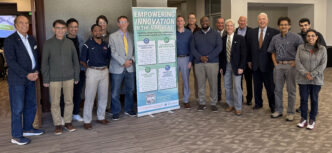
When you read about health research, organizational science most likely doesn’t come to mind.
But in health care, organizational science is called health systems science, and it’s a big research focus between Clemson psychology associate professor Marissa Shuffler and Donald Wiper, a clinician leader and research champion at Prisma Health.
Organizational science is an important part of solving an issue health care providers are facing across the nation–burnout. For the past year and a half, Shuffler and Wiper have been working together on burnout and team science research.
This partnership comes at an important time, as The National Academy of Medicine notes that more than half of U.S. health care providers experience substantial symptoms of burnout, and burnout symptoms can be prevalent among nurses, other health care professionals and students as well – at rates higher than workforce members in other industries. Burnout, depression and emotional exhaustion can result in medical error, quality and safety issues, high staff turnover and mental health concerns.

Shuffler and Wiper’s research partnership will be highlighted at the Healthcare Organizational Science Table Top event on Oct. 1.
What started out as leadership research has expanded to work on team science and burnout. The result is a unique and lasting collaborative effort that has been implemented in Prisma Health–Upstate and federal opportunities for organizational science research.
Shuffler has expanded her National Science Foundation Early CAREER award team science research in the health care and engineering fields. In conducting research to develop tools and resources for better teamwork, her initial NSF CAREER research identified a need to focus on different dimensions of burnout of health care providers and leaders.
Shuffler and Wiper, along with a team of Prisma Health clinicians, Clemson graduate students, and colleagues at Rice University have identified five burnout profiles in health care leaders, based on surveys from over 900 health care employees. Burnout by definition is emotional exhaustion, depersonalization, and feeling ineffective at work, Shuffler said.
The five profiles of burnout range from engaged with work but exhausted; to feeling ineffective and disengaged at work; to burned out completely. Shuffler said the ultimate goal is to develop practical, scientifically based interventions that relieve or lessen the prevalence of these varying degrees of burnout. Her research team has been focusing on the burnout profiles of leaders, since leader burnout trickles down to negatively impact the teams they lead.
“We are looking at where and when we can better pinpoint implementing interventions, so that the right interventions are put in place based on what providers actually need” Shuffler said.
Burnout can start before health care providers are even out of school, Shuffler added, and some of the early signs of burnout are simple exhaustion or not meeting personal goals because of work activities.
Wiper, who is also a gynecologic oncologist at Prisma Health, said he sees the effects of burnout in the medical environment, and notes the next phase in their research is to look at how the organization of the health care system can be modified to reduce and prevent burnout, industry-wide.
“Yoga and mindfulness are all good for those under stress, but the reality, however, is that 90 percent of burnout cases are not just about an individuals’ resiliency, but the structure of where they work,” he said. “Preventing burnout is about how the workplace functions, and that’s the organizational science part of it.”
While Shuffler and Wiper are working on their independent research, they are also part of a steering committee overseeing 14 projects that make up a larger initiative across Prisma Health-Upstate, Enhancing the Practice of Medicine. Those projects all have a common goal to reduce the unnecessary stress and burnout, and were implemented in pilot last fall, Wiper said.
The teams working on these projects consist of clinicians, and researchers from a variety of disciplines such as industrial engineering, human factors and psychology, Shuffler said.
“Working with team members from different backgrounds helps us think in different ways to find solutions to issues that health care providers face,” she added.
 Wiper said organizational science can be applied to any discipline, as long as those involved just understand how organizations work.
Wiper said organizational science can be applied to any discipline, as long as those involved just understand how organizations work.
“It doesn’t matter that a researcher doesn’t know any particular specifics about health care, it matters that the researcher knows how organizations work,” Wiper said.
He said teams of researchers from backgrounds in psychology, human factors, industrial engineering and management engineering, are needed in health care organizational science to look at the health care system holistically to find issues and solutions.
On Oct. 1, Clemson University School of Health Research will host Wiper and Shuffler, along with Clemson professors Anjali Joseph, Kevin Taaffe, Gabriela Sava, Tom Britt, and Kathleen Valentine to discuss their research as well as the future of organizational science research. They invite anyone interested in organizational science to join in the discussions, network and form new collaborative partnerships.






